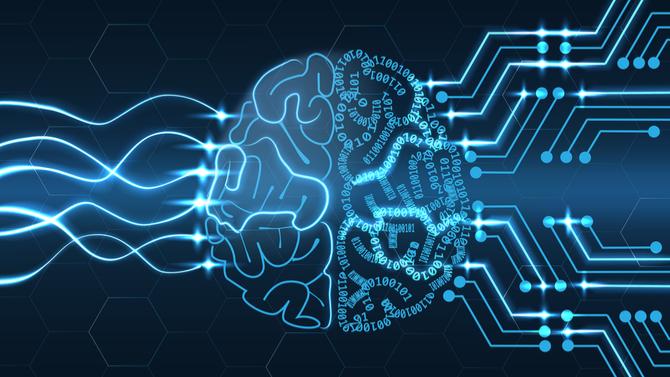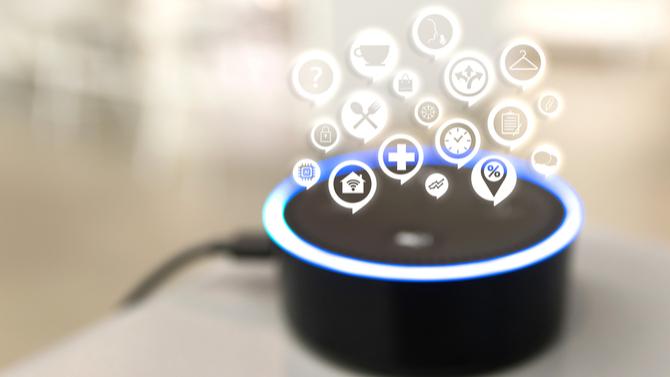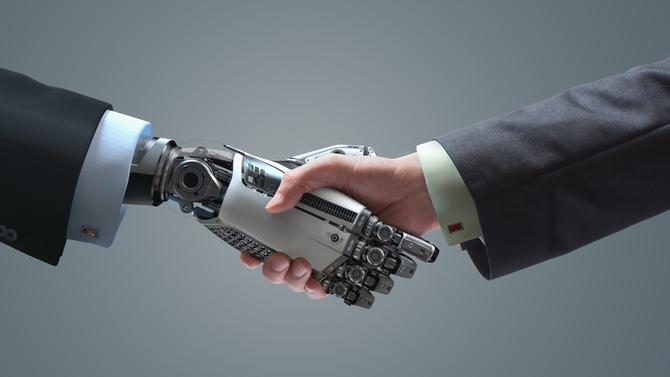
It’s true, the robots are coming. Machine intelligence will soon be infinitely more powerful than all human intelligence combined, and artificial intelligence will render us unemployed. As a species, we will merge with machines, and in the process, we will lose our ability to independently function, make decisions, interact with others and go about our day.
Ray Kurzweil, Google’s guru of AI and futurism, believes that “medical robots will go inside our brain and connect our neo-cortex to the smart cloud” by the year 2029. What he is describing there is chips inside our brains that will allow us to simply think about a question and get an answer, rather than to ask ‘Hey Google’, or ‘Hey Siri’.
If that all sounds dystopian to you, that’s understandable. Fear is a common reaction when discussing the implications of AI and the impact it will have on our lives. However, optimists argue that AI may well actually improve our existence, including how we work.
For many, AI remains a mystery. The industry itself is in its infancy, and some questions remain about this groundswell of change that is often referred to as the ‘Fourth Industrial Revolution.’ One thing is certain, however, and that’s the inevitability of AI’s influence in the business sphere.
Tech companies are booming across the globe, and they’re working fast on developing AI solutions applicable to industry. These companies aren’t just the tech giants like Google and Amazon. Start-ups are achieving rapid success, partly because scaling up companies in an AI enabled and cloud environment is much easier, simpler and less reliant on large head counts.
AI driven efficiencies could soon be seen across a wide range of fields including insurance, banking, recruitment, marketing, travel, security, accounting, customer support and more. Many companies are already using intelligent automation to shed themselves of basic administrative and laborious tasks.
As AI and its applications evolve, it’s important for businesses to have a top level understanding of the industry and its possible implications for the future. This article takes a look at the fundamentals of AI, how it’s changing our lives and the implications for SMEs.
What is The Definition Of AI?

The term AI is typically applied when machines complete tasks such as planning, learning, reasoning, perception and problem-solving in order to achieve prescribed goals.
Wikipedia defines AI as “intelligence demonstrated by machines, in contrast to the natural intelligence displayed by humans and other animals. In computer science AI research is defined as the study of "intelligent agents": any device that perceives its environment and takes actions that maximize its chance of successfully achieving its goals.”
Wikipedia also makes a distinction between ‘narrow’ and ‘general’ AI. Narrow AI is a machine focused on one task (such as Siri), whilst general AI refers to machines capable of experiencing consciousness (such as IBM Watson or Google’s DeepMind).
Amit Bansal, Applied Intelligence Lead, APAC, Accenture, says that AI will transform the relationship between people and technology, charging our creativity and skills.
Says Bansal, “AI as we know it isn’t really a technology in its own right at all. In reality, it’s a collection of different technologies, each evolving rapidly along its own S-curve. When they come together, they enable a machine to sense, comprehend, act, and learn with what seems like human levels of intelligence.”
What Is Machine Learning?
According to Daniel Fagella at Techemergence, machine learning is “the science of getting computers to learn and act like humans do, and improve their learning over time in autonomous fashion, by feeding them data and information in the form of observations and real-world interactions.”
Big Data and Artificial Intelligence – Are They Linked?
We’ve all heard plenty about big data and its impact on business. Artificial intelligence technologies rely on this data – it’s the lifeblood and what powers and enables the algorithms to find trends, patterns and predictions.
AI is central to digital transformation. With increasingly mind-blowing volumes of data being created every day, more sophisticated tech is needed to work with this data, in order to extract value.
Traditional data uses centralised database architecture in which large and complex problems are solved by a single computer system. Big data, on the other hand, is based on the distributed database architecture where a large block of data is solved by dividing it into several smaller sizes.
Is The AI Revolution Real For SMEs?

AI is already infused into our day to day lives. Witness the advent and rapid acceptance of voice activated assistants such as Siri, Cortana and Alexa, for example.
Debate continues in the AI community about the practicality of some of the AI tech being developed for small business, so it pays to know what is real and what is just buzz.
Mike Dudarenok, Chief Customer Officer, Technology, Flight Centre Corporate Brands Australia, says that the successful development of AI solutions demands high end expertise and in depth understanding of consumer behaviour.
Says Dudarenok, “The best AI solutions for a consumer or a business are the ones which hide the complexity and make the underlying process simple.”
“For example, it is the simplification of the interaction with Alexa or Google Home which makes it so compelling. How many times have you bought an item shortlisted in the “people also bought” or relied on Google to tell when to leave to your next appointment – this is the simplicity of artificial intelligence in action,” he says.
Dan Fagella at Techemergence says that it’s important for small business owners not to be mired and distracted by the hype of AI, but to understand it for what it is and to only pay attention to the kinds of AI solutions that might make a difference in their businesses.
Says Fagella: “There are three levels of investment and expertise that determine which businesses are able to access AI solutions: creating an AI solution; working with an AI vendor company; and using an AI tool.”
Using an AI tool is likely the fastest and easiest way for SMEs to take advantage of AI tech.
“For a small business to implement an AI solution, that solution has to genuinely work “out of the box.” This means that it would be ready to use without any training, talent, or tweaking. AI tools like these don’t require in-house data science talent, data infrastructure or venture money,” says Fagella.
How Is AI Changing Business?

While we are starting to hear more and more about AI, it has been changing business for years. From data and insights driven decision making, to optimised deliveries to flight route optimisation, all these things rely on different types of AI.
Dudarenok says that customers’ expectations are no longer shaped by competitive offerings, but are shaped by other unrelated business and services, and that all businesses are now compared to the giants.
“Our customers expectations have been shaped by AI even though they have not realised it. To deliver amazing user experiences, giants like Baidu, Amazon, Google, Facebook, Uber have embedded AI into all facets of our lives – and we like it as users and expect the same level of experience elsewhere,” he says.
Smart businesses are deploying AI to automate repeatable processes and supplement their human capital.
Dan Fagella at Techemergence says that AI in a broad sense is allowing software (and physical machines) to gain a more autonomous capability.
Says Dan, “Maybe even more importantly, the trend of machine learning is permitting businesses to "improve with use" - a virtuous cycle which is in large part responsible for the success of Facebook, Google, Amazon, and Netflix.”
Bansal says that business success will increasingly depend on people and machines collaborating rather than competing with each other.
Says Bansal, “AI will actually elevate people’s capabilities as workers help train and continuously improve intelligent machines and deal with higher value activities that machines can’t resolve.”
68 percent of Australian executives say they plan to use AI to automate tasks in the next three years. Interestingly, 71 percent of the same executives suggest that intelligent technologies will result in a net gain in jobs for their companies in the same period.
Reducing the workload while increasing workers may sound paradoxical, but AI offers unmatched opportunity for commercial growth. It will not only drive efficiencies, reducing the amount of work required to complete a task, but will also create new forms of growth and innovation – and in turn, job opportunities.
To succeed, however, organisations must reimagine work, pivot their workforce to new growth models, and ‘new skill’ their people to do more valuable work.
What Are The Business Applications Of AI?
Amit Bansal of Accenture lists a few examples of projects they are working on and how AI is taking shape in various industries:
- Intelligent Insurance Claims Processing: integrating machine learning into traditional claims dashboards designed to model the expertise of individual agents, freeing them up to spend time on the subset of claims where human expertise is needed
- Fraud Detection: infusing intelligent systems to spot anomalies in large data sets, empowering human agents to investigate
- Drug Testing: prototype systems are being developed for law enforcement agencies that optimize limited resources and identify higher-risk cases
- Pharmacovigilance: assisting pharmaceutical companies to use natural language processing, machine learning and rules to automate drug safety analysisCognitive Robotics: machines going beyond simple, mechanical automation to new levels of judgment-based automation, enabling new levels of productivity and accuracy.
- Virtual Agents: agents can automate dialogue with users in natural languages and understand and resolve complex user queries by applying “Deep Learning,” such as the ability to automate judgment on images.
5 Things AI Can Already Do For Your Business:
There are a lot of vendors globally working quickly to create new business applications based on AI. For small businesses, the tools they are creating are the most accessible way to tap into AI efficiencies. These out of the box solutions can help in areas such as:
- Recommendation engines: intelligent functionality that gets to know your customer’s preferences and can make personalised decisions and recommendations
- Customer service: automated chat bots, website data collection tools
- Marketing and Customer insight: predictive CRM software and automated responses
- Recruitment: automated resume and applications reviews, talent sourcing, pre-screening
- Banking: streamlined loan processing including automated determination of creditworthiness, streamlined the loan processes and customer experience
Dan Fagella, of TechEmergence, issues caution when it comes to the kinds of promises that are being made about AI and its application to small business.
Says Fagella, “95% of the "AI for small business" buzz is useless. The majority of small businesses will not be able to access AI's capabilities until it makes its way to the level of other software (i.e., when no data science skills are needed to use it). Facebook Ads, Google maps, and some email marketing solutions involve AI "behind the scenes", but broad changes (over the next 3-5 years) will need to take place to make more robust AI capabilities accessible to small business owners.”
What are the pros and cons of AI?

According to Dr Natalie Rens, AI Specialist, Office of the Queensland Chief Entrepreneur (twitter @Natalie Rens), the benefit of AI is that it's able to process complex data a lot more efficiently than we are.
Says Rens, “This gives you the power to draw insights on customers, to perform medical diagnoses, or even to automate interactions with the physical world like self-driving cars are starting to.”
On the flipside, Rens argues that one of the cons is that AI typically requires a lot of data and we aren't yet very good at diving into the so-called "black box" of neural networks.
“This means that we can find it difficult to understand why an algorithm is able to reach the outcomes it does. This is particularly an issue when the use of AI directly impacts human life, for example in hiring policies or even criminal sentencing," says Rens.
The Ethical Considerations Of AI
With new technology comes a variety of new challenges, none the least of which are ethical questions.
When human decisions are entrusted to machines, it potentially opens the door to errors in reasoning.
A key challenge for AI moving forward is to ensure bias is eliminated, as well as ensuring that the people creating the AI systems or platforms do not embed their own judgements. Additionally, guaranteeing that machines are learning the way we want them to is critical.
Data ownership and probity is also an issue. Witness the large data driven companies with AI capability that have already come under scrutiny for their actions, revealing a tendency to use data for their own benefit as well as a lack of transparency. Businesses need to develop clear policies on their ethical position with regards to data usage and they need to share these policies with their customers.
How Does AI Affect Decision Making?
Possibly the best use of AI in decision-making is where it's used as a tool to do the real crunch work but then people add their own insights and intuition to its output.
Says Rens, “We see this more and more with medical treatments, where AI can be used to more accurately determine a diagnosis and, in doing so, ultimately allows the doctor to focus on deciding the best treatment for their patient. Also, nobody wants to hear they have cancer from a robot.”
What is the future of AI?

Rens thinks that across the board, we are currently seeing stunning advances on almost a daily basis in AI.
“I would like to think that we crack natural language within the next decade, so that voice-based communication can become the norm. With the amount of investment in self-driving cars, they should also start to take over as the primary form of vehicle in the coming decades. Then at some point we will develop algorithms that, unlike today's, can learn more generally across domains. By that stage, I hope we've got good ethics firmly in place,” she says.
While AI technology is constantly evolving, the strength of today’s AI is in automating administrative and laborious tasks; it is less adept at tackling ‘human’ tasks that rely on creative capacity, social interactions, complex judgement, services and experiences.
Says Bansal: “The sectors that are expected to be the most impacted by AI within the next decade include industry, manufacturing, customer support, accounting, postal and delivery services.”
“Businesses working within these spaces are – willingly or not – becoming AI pioneers, which comes with a certain amount of responsibility. For both the business and its staff, it’s crucial that this transition is handled correctly,” he said.
How To Prepare Your Business For The AI Revolution
Bansal says to effectively leverage AI, and mitigate its negative ramifications, organisations need to:
Reimagine work
- Assess tasks, not jobs: Allocate work to machines and people, balancing the need for automation and augmentation.
- Create new job roles: Free people from function roles and build agile, project-based teams.
- Map skills to new roles: Assess internal capabilities required for new roles, then match these to existing skills, or source new talent when required.
Pivot the workforce
- Foster a new leadership DNA: Cultivate leaders at all levels to help pivot the workforce to new growth models.
- Recognise the business case: Use automation to fuel growth by reinvesting profits in the future workforce.
- Pivot the workforce to new business models: Orientate teams to support new customer experiences.
- Organise for agility: Create flexible processes; manage the workforce to support both the core business and the new.
Scale up new skilling
- Prioritise skills for development: Strike the balance between technical skills, judgment skills and soft skills.
- Target ‘new skilling’: All employees will work and learn differently. Cater to different levels of skills and willingness to learn.
- Go digital: Use VR, AR and Al to accelerate the speed and scale of effective training.
How Employees Can Prepare For The Future World Of Work

According to Bansal, workers may not have much say in how businesses approach the adoption of AI, but they do have control of their own destiny. Here are his tips for workers of the future:
- Be smart risk takers: By taking risks, professionals open the door to new possibilities, including new markets, new customers and new innovations. But they must also be smart about managing these risks. They need to mine data and analytics to understand the facts, and then develop strategies that deliver superior results.
- Be curious and adaptable: understand that unprecedented change is the new normal in business. All professionals must accept this reality and be comfortable with the art of navigating an environment of ambiguity and uncertainty.
- Be relevant and stay relevant: this is the name of the game. Employees must be open to new ideas, new skills, listen and ask questions, and importantly – never be satisfied with the status quo.
The Future and You
The development of AI technology has reached a fascinating point. We have moved to a stage where the tech is now making tangible differences to our lives, but we are realistically only at the very beginning of the journey.
Many questions lay ahead - both technical and moral - but for now, keeping abreast of the changes and the implications for business is an important task. Smart businesses that adopt the right AI solutions at the right time may find competitive advantage and give themselves a greater chance of survival in an increasingly technical business environment.